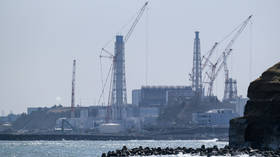Cancer patients sue company behind Fukushima radiation

Six people were children living near the Fukushima nuclear power plant at the time of the 2011 disaster, when the facility was heavily damaged in an earthquake and subsequent tsunami.
The plaintiffs have since developed thyroid cancer, blaming radiation that seeped from the power plant for their condition.
“Some plaintiffs have had difficulties advancing to higher education and finding jobs, and have even given up on their dreams for their future,” the group’s chief lawyer, Kenichi Ido, told AFP.
The plaintiffs, now aged between 17 and 27, are seeking compensation from the Fukushima operator, the Tokyo Electric Power Company Holdings (TEPCO). They demand the company pay a total of 616 million yen ($5.4 million). The plaintiffs have experienced prejudice against thyroid cancer patients, with the illness heavily affecting their lives, one of the group members – identified only as a woman in her 20s – has said.
“I decided to come forward and tell the truth in hopes of improving the situation for nearly 300 other people also suffering like us,” she stated.
The lawsuit has become the first class-action against TEPCO over health problems allegedly linked to the Fukushima disaster. Establishing a solid link between thyroid cancer and the meltdown is likely to become a focal point of the case, since no relationship between cancer cases and the disaster was recognized by an expert team previously established by the regional government. At the same time, radiation exposure is a well-proven risk factor for developing such type of cancer.
Over 290 people who lived in the area at the time of the meltdown have been diagnosed with or are suspected of having thyroid cancer. Some 266 of them were found during a provincial health survey of people aged 18 and younger at the time of the disaster, which affected some 380,000 residents.
The plaintiff’s legal team argues that such rates – 77 per 100,000 – are significantly higher than the usual one to two cases per one million people. Regional authorities and experts, however, have blamed the unusual rates on excessive screening and over-diagnosing.
The Fukushima power plant got crippled following the 2011 9.0-magnitude Tohoku earthquake and a subsequent devastating tsunami. The plant suffered a major meltdown, which became the worst nuclear disaster since the 1986 Chernobyl incident. The catastrophe prompted an evacuation order for nearby towns and villages, which has been gradually lifted over the past few years. The last deserted settlement – the town of Futaba located in an immediate vicinity of the damaged plant – is expected to welcome residents willing to return later this year.












